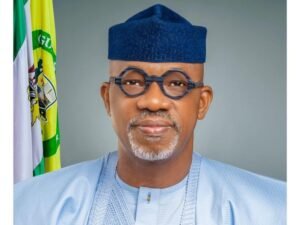
The Federal Inland Revenue Service (FIRS) has stated that Nigeria refused to endorse the Organisation for Economic Cooperation and Development (OECD) Minimum Corporate Tax Agreement because it does not serve the overall interest of the country.
Executive Chairman of FIRS, Mohammad Nami gave this explanation at the recent tax conference organised by the Chartered Institute of Taxation of Nigeria (CITN).
Nami, was responding to the comment by Mr Aigboje Aig-Imoukhuede in his lead paper at the conference where he queried the wisdom of Nigeria along with three other countries, including Kenya, Pakistan and Sri Lanka, in refusing to sign the global minimum tax deal initiated by the OECD countries in response to the digital 4th industrial revolution.
His comment was further stressed by the President of CITN, Adesina Adedayo in his welcome address when he expressed misgivings over Nigeria’s refusal to sign the 15-point Organisation for Economic Co-operation and Development Base Erosion and Profit Shifting (OECD-BEPS) Action Plan, particularly action plans 5, 6,13 and 14, which he said formed the implementation of the OECD-BEPS Project 4 minimum requirements.
He warned that Nigeria’s resort to reciprocal jurisdiction has its own implications in the disruption of the global tax space.
But Nami in his reaction said Nigeria’s cautious approach to the endorsement of the (OECD)/ G20 Inclusive Framework two-pillar solution to the taxation of the digital economy is in the best interest of the country, and to ensure that Nigeria does not lose out on potential revenue from the digital economy.
Explaining why the agreement is unfair to Nigeria and the developing countries in general, Nami stated that the country, having reviewed the conditions of the agreement, had concerns about the impact that the signing of the agreement would have on the country’s tax system and tax revenue generation.
“There are serious concerns on how the rules would compound the issues in our tax system. For instance, to be able to tax any digital sale or any multinational enterprise (MNEs), that company or enterprise must have an annual global turnover of €20 billion and global profitability of 10%. That is a concern. This is because most MNEs that operate in our country do not meet such criteria and we would not be able to tax them.
“Secondly, the €20 billion global annual turnovers in question is not just for one accounting year, but it is that the enterprise must make €20 billion revenue and 10% profitability on average for four consecutive years, otherwise that enterprise will never pay tax in our country, but in the country where the enterprise comes from, or it is country of residence”, he added.
Thirdly, he noted that for Nigeria to subject a multinational enterprise to tax under the rule, the entity must have generated at least €1 million in turnovers from Nigeria within a year.
Nami stated that this is an unfair position, especially to domestic companies which, with a minimum of above N25 million (that is about €57,000) turnover, are subject to companies’ income tax in Nigeria.
He added that this rule will take so many multinational enterprises from the scope of those that are currently paying taxes to Nigeria.
In other words, even the MNEs that are currently paying taxes in Nigeria would cease to pay taxes to us because of this rule.
Fourthly, on the issue of dispute resolutions under the Two-Pillar Solution, the FIRS Executive Chairman explained that the rules were such that in the event of a dispute between Nigeria and a Multinational Enterprise, Nigeria would be subject to an international arbitration panel against Nigeria’s own justice system.
“It would be subject to international arbitration and not Nigeria’s judicial system and laws—even where the income is directly related to a Nigerian member of an MNE group, which is ordinarily subject to tax in Nigeria on its worldwide income and subject to the laws of Nigeria. We are concerned about getting a fair deal from such a process.
“More so, such a dispute resolution process with a Multinational Enterprise, in an international arbitration panel outside the country, would lead to heavy expenses on legal services, travelling and other incidental costs. Nigeria would spend more; even beyond the tax yield from such cases,” he said.
On the issue of Nigeria losing significant revenue if it fails to sign in to the OECD Inclusive Framework rules for the taxation of the digital economy, the FIRS Executive Chairman noted that this was not a problem as the country had already put forward four ongoing solutions to the challenge of taxation of the digital economy.






